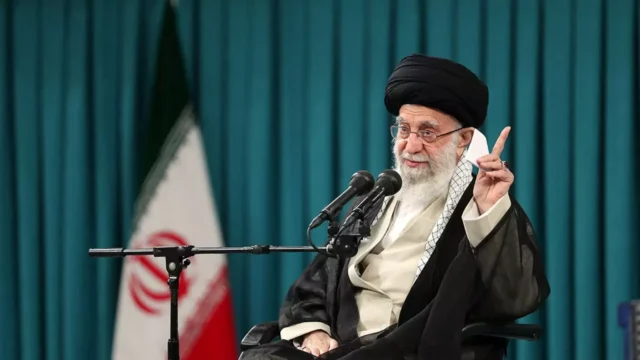The Iranian government said its rocket and missile attack was “measured and moderate,” and that it could have, but did not choose to, launch a much bigger strike on Israel. Iran’s supporters in Europe and the United States appear to have agreed and spent much of last week counseling Israel to show restraint and forego retaliation. All of them fail to mention that had the Iranian attack been successful, it would have been regarded as an existential threat and Israel would have retaliated massively against Iran and its proxies.
Whether out of fear of Tehran or out of the belief that Tehran is or can be a responsible actor in the region is unclear, but all are arguing for appeasement of the aggressor.
Israel decided differently and has now carried out a small strike on an air base in Isfahan in Iran. The government in Tehran spent some time denying that an Israeli attack occurred at all and there is as yet no word on any damage the airbase may have sustained.
To carry out this strike, the Israel Air Force (IAF) knocked out critical radars in Syria that could track Israeli aircraft and missiles. Refueling aircraft were launched to demonstrate that multiple sorties against the selected target in Iran could have been carried out but were not. And Iran’s air defense systems, largely composed of Russian S-300s and home-built systems, appear to have caused no injury to the IAF.
When Iran attacked Israel, the U.S. Central Command (CENTCOM) – directing U.S. Naval, Air and ground defenses – supported Israel by interdicting Iranian drones, cruise missiles and ballistic missiles. Jordan also helped, as did Saudi Arabia.
In the Israeli retaliation, the U.S. stood aside. The Pentagon claims it was only told about the attack at the last minute, but it would have been impossible for Israeli aircraft to operate against Iran without passing U.S. bases and ships deployed in the region. This means that the US deliberately removed itself.
This is bad news, but not surprising. While often claiming to have Israel’s back, President Biden had clearly threatened to leave Israel on its own regarding even a limited strike answering Iran’s massive attack. Israel made its choices with full knowledge of American limits.
This has implications for the future.
For more than 20 years, American presidents have said the U.S. would act to prevent Iran from acquiring nuclear weapons. These pledges were always interpreted as full-spectrum commitments: that either by diplomatic or military means, the U.S. promised that Iran’s acquisition of nuclear weapons would be prevented.
After the Iranian attack against Israel, Ahmad Haqtalab, head of Iran’s nuclear protection and security corps, said Tehran could review its long-standing “doctrine and nuclear policies,” moving away from its announced position of “no nuclear weapons.” This, he said, would be Israel’s fault.
This would also be a lie. Empirical evidence has for years indicated that Iran is working to perfect nuclear bombs and delivery systems. The International Atomic Energy Agency (IAEA) provided cover for Iran by saying there was no clear intelligence information. But this week, with a possible change in Iran’s stance, IAEA Chief Rafael Grossi admitted that Iran could produce a nuclear weapon “within months.”
The U.S. has made no official statement about Iran’s escalating nuclear threat, or about leaked reports that “next time” Iran plans to use radiological weapons (dirty bombs) in a follow-on attack against Israel.
For historical accuracy, it should be noted that the IAEA said the same thing about Saddam Hussein’s Osirak reactor, which Menachem Begin wisely ordered destroyed in 1981. The US did not support Israel on that either.
President Biden has gone further than any other U.S. president in helping Iran by removing sanctions on Iran and its proxies; failing to veto the expiration of UN sanctions on Iran’s ballistic missile program; issuing billions of dollars’ worth of sanction waivers on Iranian oil deliveries to China and elsewhere; ignoring illegal American parts found in Iranian drones used in Ukraine; and releasing billions of dollars to the anti-Israel and anti-American regime. The president has never explained why the U.S. has taken so many steps that benefit a regime that has been sanctioned for terror activity at many levels.
Doing so has undermined U.S. credibility in the Middle East and Persian Gulf region and leads to the conclusion that the American promise to protect against Iran’s acquisition of nuclear weapons is open to serious doubt.
Protection of the Mullah-led regime is a very dangerous policy that could easily backfire in a big way, a fact not lost on America’s allies and friends in the region and farther afield.
Americans should demand explanations from the White House and State Department and push for a change in policy.
Urgently.






